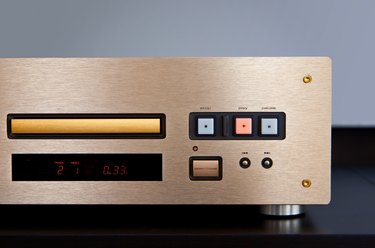
In electrical terms, "grounding" describes the safe directing of electricity into the earth. This is an important element of all home electrical appliances, including audio components. One of the most common problems that occurs when testing a newly set up home stereo system is a low-pitched hum that is heard at all times and with all functions. The usual explanation for this is that the receiver, which is the stereo's "nerve center," has not been properly grounded. Once this problem is solved, not only should the hum disappear, but the operation of the receiver should be better and safer. While attaching the ground wire, the receiver should not be plugged in.
Step 1
Choose an adequate ground. The household metal that attaches directly into the ground is typically a cold water pipe. Any pipe connected into the house's water system, however, will serve as an appropriate ground connection. The pipe will need to be unpainted and otherwise uninsulated, so that a bare wire can be connected directly to it.
Video of the Day
Step 2
Cut ground wire to adequate length. Take the roll of 16 gauge wire, knot one end of it loosely at the location of the receiver, and walk it to the area where it will be attached to the water pipe. Be sure to allow for extra length needed for running the wire along walls or behind furniture. Once the wire has been brought to its grounding point, allow a little more length than necessary and then cut it with a pocket knife.
Step 3
Strip both ends of the wire. Use a stripping tool or the pocket knife. Be sure to cut through the insulation, but not into the wire strands themselves. On the end to be connected to the receiver, strip away about 1 inch of insulation and twirl the wire ends until they compact into a solid mass. On the end to be connected to a grounding pipe, strip more insulation away, exposing enough wire to wrap around the pipe about 1 1/2 times. Repeat the wire twirling process.
Step 4
Attach wire to receiver. The back panel of the receiver will have a connector that is marked as "ground" or "ground wire." (Don't confuse this with the grounding attachment for a turntable.) The connector will be either a hand-adjusted knob or, more rarely, a screw that requires a screwdriver. Wrap the twirled end of the cord around the shaft so that, when it is turned clockwise to tighten, the wrap of the wire is not undone. If a washer is present, the wire should be wrapped under the washer so that the tightening screw doesn't push the wire out.
Step 5
Attach wire to best grounding source. Cut off several inches of electrical tape from the roll. Wrap the other stripped end of the wire around the pipe as tightly as possible and apply tape, wrapping it tightly to hold the wire in place.
Step 6
Test the system. Plug in the receiver, turn it on, and operate it.
Video of the Day